New developments to watch that could derail the state’s case against Chauvin.
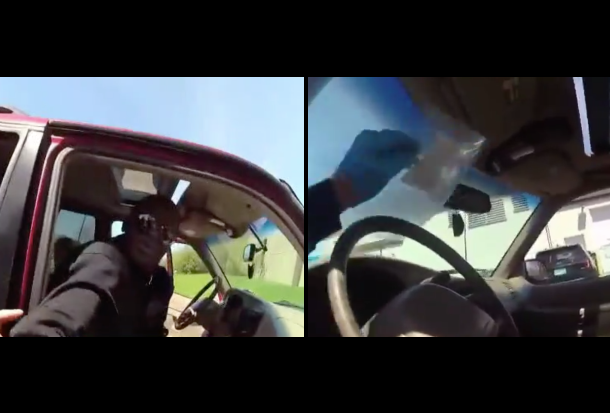
IMAGE: Scenes captured from George Floyd’s 2019 arrest video. The defense is allowed to introduce the police body cam footage as ‘medical evidence’ during the trial.
(MINNEAPOLIS, MN) – With jury selection in the murder trial of Derek Chauvin now complete, opening arguments and witness testimony are set to begin on March 29th. There’s at least one piece of new evidence that could potentially derail the state’s case against the ex-cop accused of killing George Floyd – police body camera footage from a prior arrest of Floyd in May of 2019.
Jury selection has seated a total of 15 jurors – the number that Judge Peter Cahill wanted for trial. One of the three alternate jurors, selected this week for ‘backup’, could be excused just before the empaneled jury hears the case.
Throughout the last two weeks of jury selection, several jurors were dismissed for cause, telling the court they could not be fair and impartial jurors after hearing news of the city of Minneapolis and George Floyd’s family agreeing to a ‘record-breaking’ settlement in a wrongful death civil case.
Talk of the civil settlement is so pervasive in the media that Judge Cahill told the city and attorneys to “stop talking about it!” while at the same time empathizing with potential jurors who may have ‘inadvertently’ heard something while watching television, listening to the radio or scrolling through their social media feeds.
In State of Minnesota vs. Derek Chauvin, the state and defense’s case is now coming into clearer focus in light of recent events that have happened both inside and outside of the courtroom.
Floyd’s 2019 arrest video is admissible
In a major development in the case, and as 21WIRE predicted, Judge Cahill granted the defense’s motion to present a May 2019 arrest video of George Floyd as evidence in the case.
The admissibility of the police body camera footage will be limited to “medical evidence” related to Floyd’s behavior towards officers and his health condition leading up to his arrest in that prior incident, Judge Cahill said:
“The whole point here is we have medical evidence on what happens when Mr. Floyd is faced with virtually the same situation: confrontation by police at gunpoint followed by a rapid ingestion of some drugs, we don’t know exactly how many but there was an admission that he had done it at the time of the stop.”
Judge Cahill also commented during pre-trial motions that police body cam footage showing Floyd’s behavior when confronted by officers was ‘remarkably similar’ in both the 2020 and 2019 incidents.
The court recently released the complete raw video footage of the May 2019 incident comprised of three responding police officers’ body cams.
In this short edited clip of the traffic stop (view extended clip here), Floyd can be heard on the video while officers attempt to get him to cooperate and ask him about swallowing pills. Watch:
In this 1st edited clip of #Minneapolis police body cam footage from 2019 arrest, lead officer approaches vehicle’s passenger side instructing #GeorgeFloyd to put his hands on the dash. It was during this time police say he was eating pills & situation became confrontational… pic.twitter.com/BrW5DIpntf
— 21st Century Wire (@21stCenturyWire) March 23, 2021
Robert Barnes, constitutional attorney and legal commentator, explains on a recent video podcast why this latest development in the case is “good news” for Chauvin’s defense. Watch:
According to Barnes:
“It’s now increasingly clear what really happened, in my view. What Floyd does, is when he gets pulled over, if he has contraband on him, he tries to buy time. And so, he starts saying ‘I’m worried about my mom, I think you’re going to shoot me, I think you’re going to do something bad’ – he’s learned that this is an effective tactic to deter police. And while they’re doing that, he’s either trying to get rid of evidence, drop it outside of the car, dump it some place inside the car they can’t find, or most problematically, in this case, consume and ingest any drugs he has on him.”
The defense is expected to present evidence that drugs, methamphetamine and fentanyl pills, were found in the back of the police squad car after Floyd’s death in the 2020 arrest, and similarly in the vehicle Floyd was a passenger in during the 2019 arrest – suggesting a pattern of Floyd ingesting narcotics while being arrested that led to a perilous health condition and risk of death while in custody.
Chauvin is currently charged with 2nd degree manslaughter and 2nd degree murder, and jurors could be instructed they have an option to add another charge, 3rd degree murder.
Either murder charge is problematic for the state’s case against Chauvin, after it was reported last summer that Hennepin County Chief Medical Examiner, Dr. Andrew Baker, upon receiving Floyd’s toxicology report forwarded to him by NMS Labs on May 31st, 2020, concluded that Floyd had “a fatal level of fentanyl under normal circumstances.”
Here’s a summary of Dr. Baker’s key findings:
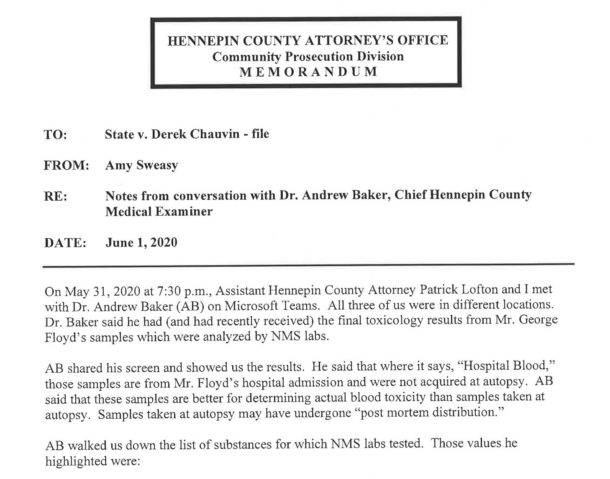
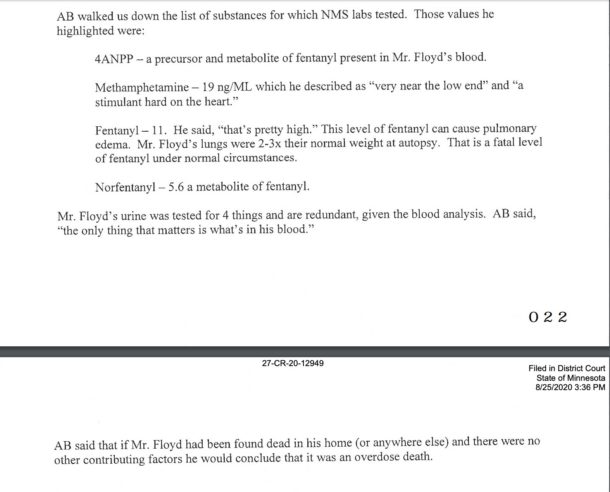
It took prosecutors until August 25th, 2020, to release Dr. Baker’s ‘explosively exculpatory’ memorandum – and by then charges had already been filed against Chauvin and the other officers involved.
During the nearly three months that prosecutors ‘slow-walked’ Floyd’s toxicology report, the U.S. also endured a summer of race-fueled street protests that included violence, rioting and even the Minneapolis Police Department’s Third Precinct getting burned down.
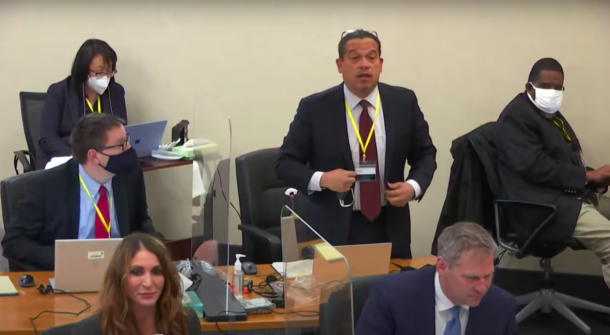
IMAGE: Attorney General Keith Ellison, pictured above standing up, though rarely seen on camera in the courtroom, leads the state’s prosecution team.
Over-charging problem
Are Keith Ellison’s 2nd and 3rd degree murder charges for Derek Chauvin over-charging? What effect will this potential misstep mean for the outcome of this trial?
The real danger is that such a massive error by prosecution could ultimately trigger a repeat of the street rage from this past summer.
Either way, perhaps the judicial dysfunction and predictable mob unrest is simply unavoidable – considering how politically loaded this incident and case was from the onset.
Criminal lawyer Alan Dershowitz is podcast host of The Dershow, where he discusses the issue of over-charging in detail, as well as other extenuating circumstances which may change the trajectory of this high-profile court drama which is now unfolding. Watch:
State and city’s ‘Crumped up’ media circus
As Minnesota’s Attorney General, the state’s top cop, Ellison pushed hard to get the 3rd degree murder charge re-instated and also promised back in June of 2020 to ‘get justice’ for George Floyd.
Courthouse News reported at that time Judge Cahill warned state prosecutors about commenting publicly on the case before it goes to trial, telling Asst. Attorney General Matthew Frank, who is now part of the state’s prosecution team in the Chauvin case, that “recent statements by Governor Tim Walz, Minneapolis Police Chief Medaria Arrrodondo, Floyd family attorney Ben Crump and others risked tainting a jury pool and could result in a gag order or change of venue.”
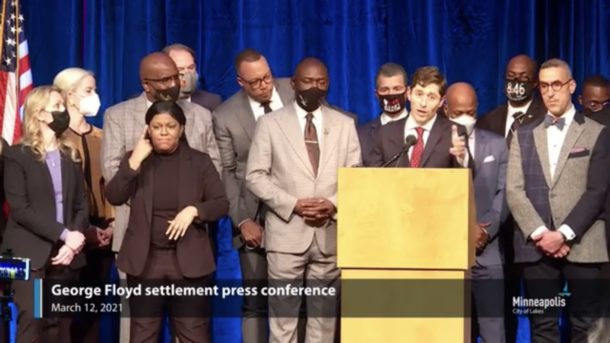
The $27 million “George Floyd settlement press conference” was streamed live by the city of Minneapolis on March 12, 2021 during the first week of jury selection in the criminal case. Mayor Jacob Frey spoke at the podium (pictured above) with a masked Benjamin Crump (left), the Floyd family’s lead attorney.
In the months leading up to jury selection, the pool of potential jurors in this case have had ample opportunity to marinate in the media coverage – for many, locked in their homes and ‘sequestered by COVID’ – seeing nonstop news headlines about everything from pending national police reform legislation to the recent $27 million “George Floyd settlement” orchestrated by Floyd family attorney, Benjamin Crump.
The city of Minneapolis agreed to the settlement during the middle of jury selection in the Chauvin trial, a criminal case, and will now have to tap its ‘rainy day fund’ reserves to pay it out.
Chauvin’s lead defense attorney, Eric Nelson, went on the record voicing his ‘grave’ concern about the timing of the city’s announcement and how it has impacted the jury in the case:
Here’s what went down in #ChauvinTrial earlier today. Lead defense attorney Eric Nelson told judge he’s “gravely concerned” re: #GeorgeFloyd “prejudicial press release that has very suspicious timing to say the least, and has an incredible propensity to taint a jury pool…” https://t.co/KIsy0ivufS pic.twitter.com/ez5H0C8oHV
— 21st Century Wire (@21stCenturyWire) March 15, 2021
Shortly thereafter, Judge Cahill granted the defense additional peremptory challenges for dismissing potential jurors to offset a possible bias due to the settlement news. He also went on the record to excoriate the media for attempting to leak confidential material from the trial proceedings. Watch:
Judge goes ballistic: #ChauvinTrial circus continues & could actually be taking its show on the road to a new venue soon… #JudgeCahill admonishes #media for trying to dox attorney notes from courtroom & disclosing ‘security details’ re: #HennepinCounty govt center. Watch: pic.twitter.com/CZAq9xTRb4
— 21st Century Wire (@21stCenturyWire) March 17, 2021
The media circus swirling around this case does not appear to be subsiding any time soon. It will likely continue to impact this jury’s ability to be fair and impartial and only consider the facts and evidence presented to them at trial.
Judge Cahill has previously denied defense’s motions for sequestering the jury – but things could change quickly depending on what new spectacle pops up next outside the courtroom.
If this trial continues as scheduled, the state’s ‘burden of proof’ is now stacked much higher than it was before.
***
Visit our LIVE Blog coverage or follow us for trial updates @21stCenturyWire on Twitter. If you like our trial coverage please do consider supporting this independent media platform. Thank you!
READ MORE CHAUVIN TRIAL NEWS AT: 21st Century Wire Chauvin Trial Files
PLEASE HELP SUPPORT OUR INDEPENDENT MEDIA PLATFORM HERE















